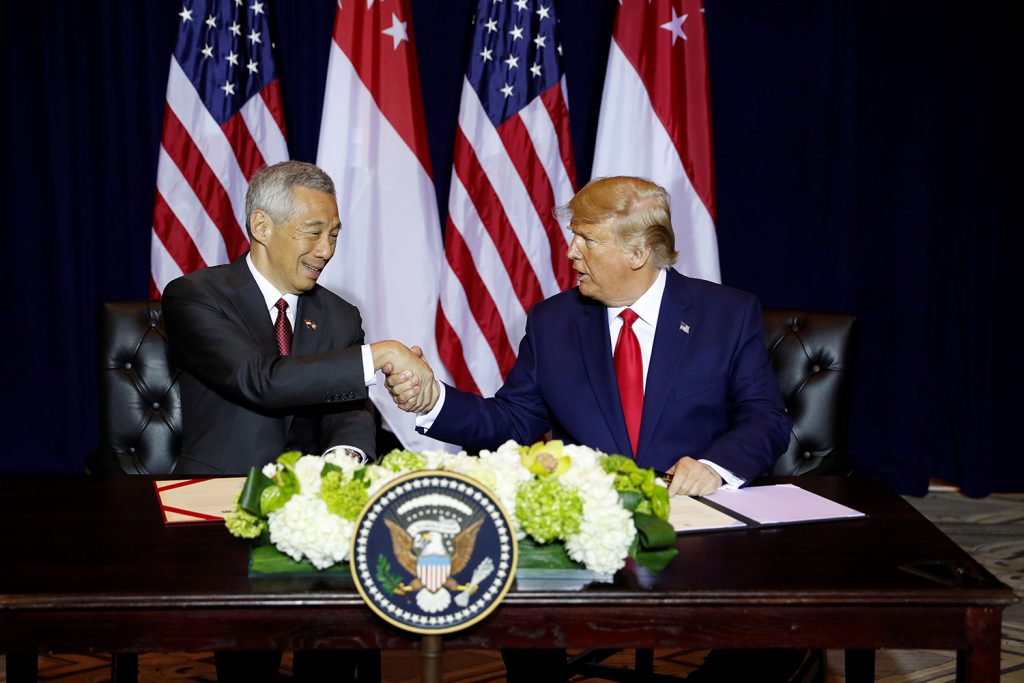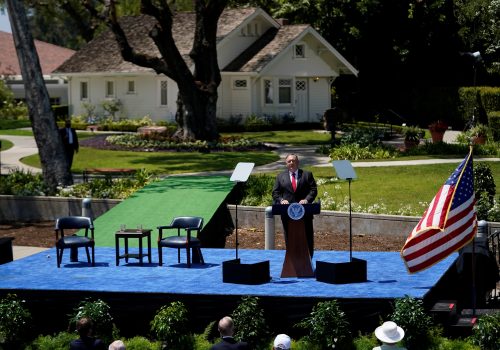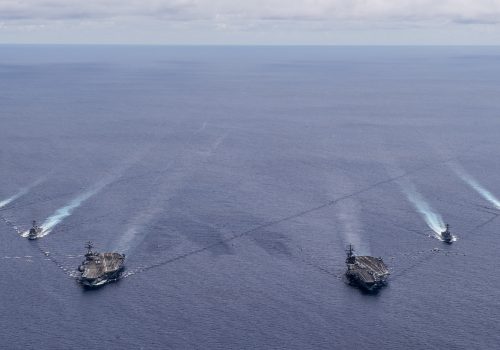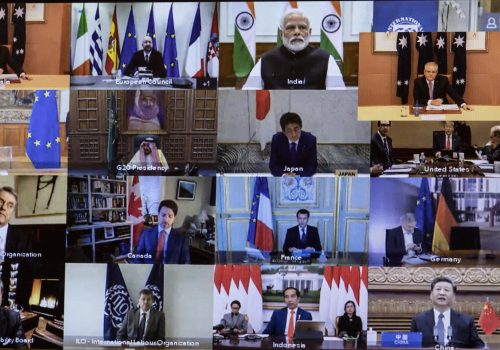Key takeaway: Lee Hsien Loong, the prime minister of Singapore, worries that Washington’s increasingly tense relationship with Beijing and domestic pressures to reduce its commitments abroad will force US policymakers to choose either a path of “colliding with China” or “deciding that you have no stake in the region and leave us to our own defenses.”
In an Atlantic Council Front Page event on July 28, Lee told moderator and co-founder of the Carlyle Group David Rubenstein that his country and other East Asian allies fear a confrontation between China and the United States, but also want to ensure that Washington is able to play its traditional role in the region “and tend to your many interests, and your many friends, and your many investments … Otherwise, a part of the world which has been crucial to you since the Second World War I think may become a problem rather than an asset to you.”
Here’s a quick look at what else Lee said on the escalating confrontation between the United States and China in his region, what his country has learned from combating the COVID-19 pandemic, how he views China’s actions in Hong Kong, and his future as Singapore’s leader.
2020 election may not calm US-China conflict
- A corrosive relationship: Lee acknowledged that “it is normal between two powers that you will have areas where you have contradictions and areas where you can work together,” but he worries that between Beijing and Washington “you have very many areas where there are not only contradictions but also deep distrust. This is corrosive and it is making a very difficult relationship very dangerous.”
- No post-election reset: In a normal election cycle, Lee would have hoped that a new administration or a second Trump term would calm things down between the two global powers. “Historically in presidential election years the US-China relationship always gets entangled in the campaign and after that, sometime when the new administration settles in, you begin to understand what really the world is like and things settle down,” he explained. But he added that things are quite different now as “the animus and—sad to say—bipartisan consensus on treating China as a threat is quite extraordinary and I fear that it may carry on over past the election. And if it does I think it bodes ill for the world.”
- Top priority is stability: Lee said the most important objective for whoever wins the US presidency in November is to “stabilize your relations with China because for the rest of Asia we depend on stable US-China relations in order for us to have a secure, predictable environment in which we can make a living and live our lives.”
- Need for consensus: He further hoped that the United States would be able to “try and develop a bipartisan consensus [on Asia] so that there is stability and predictability in US-Asian relations,” which has suffered from whiplash as a result of changes in US policy such as the Obama administration’s “pivot to Asia” and the Trump administration’s decision to withdraw the United States from the Trans-Pacific Partnership trade agreement.
- Singapore’s 2020 choice?: Asked who Singapore would like to win the US presidential contest, Lee responded, “We have no vote.” Nevertheless, he added, “we live with the outcome.”
Watch the full event:
COVID reopening “so far, so good”
- New outbreak under control: Lee reported that his government is close to containing a fresh outbreak of the novel coronavirus (COVID-19) that sprang up in the dormitories of foreign migrant workers. “We’ve managed to bring that under control. Systematically we have been clearing the dorms one by one. The task is almost complete, we should be done with it within a couple of weeks’ time,” he said.
- Masks for all: Lee attributed his country’s success in controlling the virus—recording around 50,000 cases but only twenty-nine deaths—to quick adoption of a “circuit breaker” economic lockdown, and widespread adoption of masks and social distancing. While the government initially only encouraged the use of masks, “when the science became clearer we had to change position and now it is a requirement to wear masks outdoors,” Lee explained, noting that “everybody does so. In fact, if you don’t somebody will tell you that.”
- Mixed results for app: Lee noted his country’s use of a phone-based app to help assist contract tracing by tracking users’ movements and contact with others, but cautioned that it is just one tool the government uses alongside traditional interview-based tracing methods. “It was not easy to get to work,” he conceded, but “we found it is of some help and every time we have a sick person, you get one or two contacts via the app.”
- Economic recovery on track: Singapore began reopening sectors of its economy in June, and Lee reported that progress is “so far, so good.” He explained that “manufacturing is basically normal,” while construction has been slowed by the migrant worker outbreak. The biggest area of concern is the tourism and transportation sectors, which he conceded “are going to be affected for quite some time.”
- Negative growth likely: He predicted that annual growth could be negative 3 or 4 percent, but argued that “the key thing is not the number” but rather figuring out which sectors can “operate normally” versus those that “have to be triaged and transitioned into new activities” and those that “will take some time to come back and you have to keep them in suspended animation until things go back to normal.”
Looking for a new normal in Hong Kong
- Beijing gets benefit of the doubt: Lee refrained from openly criticizing China for implementing a new national-security law for Hong Kong, arguing that the city needed a new law and failed to pass one themselves. Nevertheless, he said, Singapore is watching “what is happening in Hong Kong with concern” as the situation there continues to escalate between “a very polarized society.” Lee hopes that China’s assurances on the law’s limited impact will prove true and “as time passes, if that proves to be the case, then Hong Kong will settle into a new normal.”
- Not an opportunity for Singapore: The prime minister threw cold water on the idea that a flight of Western companies from Hong Kong could benefit Singapore economically. “We think it is better for Hong Kong and better for the region and Singapore if Hong Kong is stable and calm and prosperous,” he said. “The Asia-Pacific is a big place and there are many opportunities,” he said, dismissing the idea that Hong Kong and Singapore are economic rivals and adding that “I would much prefer Hong Kong doing well than for people looking for places to go out of Hong Kong.”
Singapore’s political future
- A clear mandate: The prime minister spoke to the Atlantic Council on the heels of another election victory for Lee’s People’s Action Party, which won eighty-three out of ninety-three seats in the parliament. Lee conceded that his party’s popular vote total of 61.2%—down from 70 percent five years ago—was a disappointment, but still is “a clear mandate and we will make the most of it and serve Singapore the best we can in the next five years.”
- A delayed exit?: Many expected Lee, who has served as the country’s prime minister for fifteen years, to soon retire from his post. Lee said that he “hasn’t decided” on an exit date yet, although he initially had hoped to leave by February 2022 when he turns seventy years old. The pandemic has made him rethink his timeline, however, as he believes he has “to see this through and hand over Singapore in good shape and in good hands.”
David A. Wemer is associate director, editorial at the Atlantic Council. Follow him on Twitter @DavidAWemer.
Further reading:
Image: US President Donald Trump signs a memorandum of defense with Singapore's Prime Minister Lee Hsien Loong prior to their bilateral meeting on the sidelines of the annual United Nations General Assembly in New York City, New York, U.S., September 23, 2019. REUTERS/Jonathan Ernst



